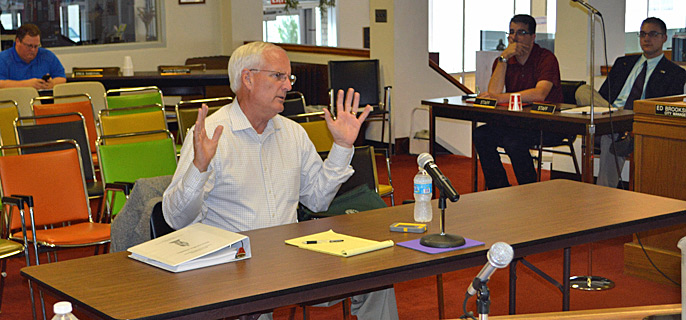
During a meeting with the Hermiston City Council this week, State Sen. Bill Hansell (R-District 29) gave a recap of his first year in the state Senate.
The Athena Republican senator said there was a bit of learning curve, but that by the end of his first session, he had established himself “as a player.” Hansell said he put a couple of his personal philosophies into action.
“No. 1, I didn’t vote no just to vote no,” he said. “I always felt that somebody was a champion of that bill. Somebody introduced it and somebody was sponsoring it. Why poke everybody in the eye just to vote no, because at some point I would have bills that I would like people to support.”
His other philosophy was to take part in every vote.
“In life, you win some, you lose some and some are rained out,” he said. “But you got to suit up for them all. As I thought back over the session, one of my proudest achievements was that I suited up for them all. I did not miss a single vote that entire session. I made sure to represent District 29.”
Hansell also quickly realized the importance of forming good working relationships with his Senate colleagues, including Sen. Jackie Dingfelder, a Democrat who serves as chairwoman of the Environment and Natural Resources Committee and who is known as a strong environmentalist. Hansell is a member of that committee and worked with Dingfelder to get a wolf bill passed, a bill Hansell calls one of the most important bills he was involved in.
The bill allows ranchers to kill a protected wolf if they catch it in the act of wounding or killing one of their livestock. They can also be killed if found guilty of “chronic predation” on livestock, but only after nonlethal methods to deter them are tried first. Other than those circumstances, the wolves cannot be harmed.
“I invited (Dingfelder) out to the Wallowas,” Hansell said. “We walked the ridges and we talked to the cattlemen and she came back with a different thought process and said that maybe we could do something. She later told me I was the first person who ever invited her to come out.”
The result was the bill passed in the House 58-2 and 30-0 in the Senate.
“Urban and rural, Democrat and Republican, liberal and conservative – we all came together and made this good legislation,” Hansell said.
Water was another key topic Hansell focused on during his first session in the Senate. He told the council this week that $11 million has been set aside to renovate the Wallowa Lake Dam in order to increase capacity and allow additional stored water to be made available to the Umatilla Basin. The state is also currently working the Canadian government on water storage projects in British Columbia with the hope of releasing some of that water for use in the Umatilla Basin.
Hansell said one of the most important tools at his disposal is simply visiting with constituents. He told the story of how a casual conversation with an Eastern Oregon hospital administrator helped saved a languishing health care bill. The administrator happened to ask about the fate of Senate Bill 2, which would provide scholarships to OSHU for Oregon students who are pursuing careers in the medical field. To receive the scholarship, the students have to return to rural Oregon and practice for one year longer than the number of scholarship years they received. If they failed to do so, the scholarship turned into a loan with 25-percent interest.
“Rural Oregon has 10 percent of the doctors and 37 percent of the population,” Hansell said. “So, we were serious about this.” The bill, however, had basically been set aside and nearly forgotten about. Just by asking a couple of key lawmakers about the status of the bill, Hansell was able to get the bill back on track and it eventually passed and is now state law.
“It may have fallen through the cracks if the local folks in Wallowa County hadn’t said something about it,” Hansell said.
Hansell said he is also optimistic about getting future water bills passed.
“I’m on the right committee, which is environment and natural resources,” he said. “I’ve built a good working relationship with the chairman. I know my predecessor, Dave Nelson, was sometimes frustrated that he couldn’t get stuff done through that committee, but he wasn’t on the committee. Being on the committee helps open up some important doors.”










